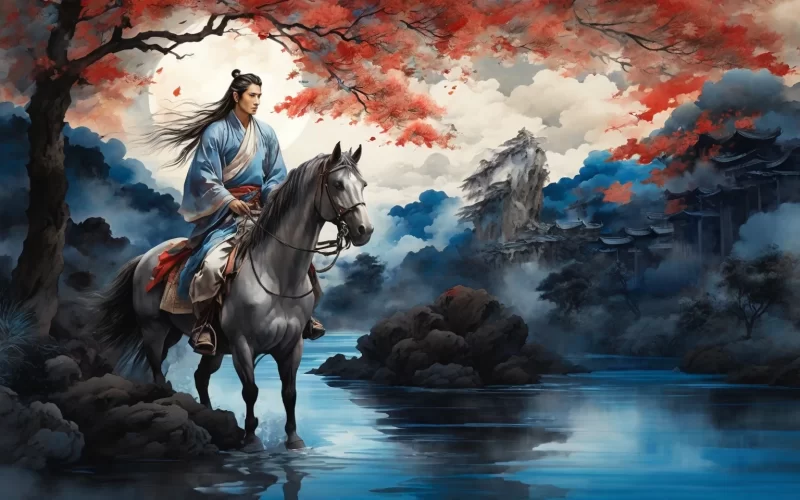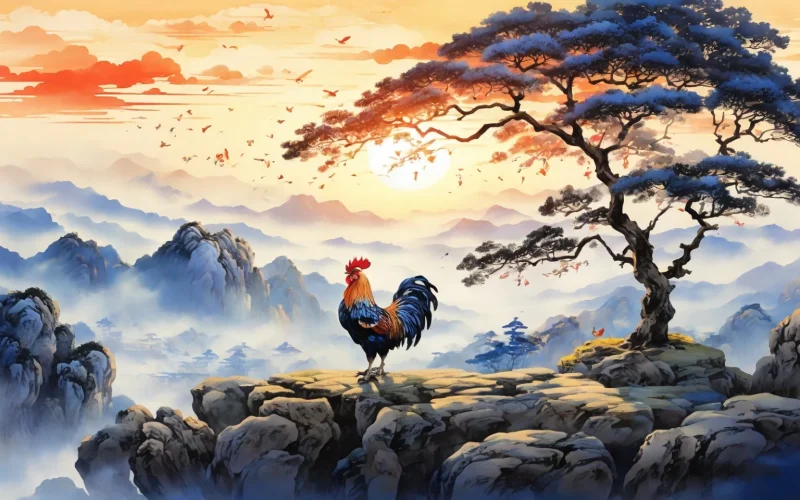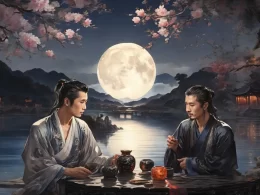Since olden days there is no rope to bind the sun.
How could we stop the cloud and water on the run?
I'd like to buy the vast sea from the goddess nice,
But a cup of spring dew soon turns as cold as ice.
Original Poem:
「谒山」
李商隐
从来系日乏长绳,水去云回恨不胜。
欲就麻姑买沧海,一杯春露冷如冰。
Interpretation:
This poem was composed by Li Shangyin during his visit to a famous mountain. Inspired by the scenery, he laments the passage of time and the impermanence of life. Through romantic imagination, the poet imbues an age-old theme with fresh meaning, reflecting deeply on time and fate.
First Couplet: “从来系日乏长绳,水去云回恨不胜。”
(There has never been a long rope capable of tethering the sun, and as the river flows eastward and clouds circle back, one is overwhelmed with regret.)
By referencing the classic imagery of a “rope to bind the sun,” the poet conveys his helplessness in the face of time’s relentless passage. The cyclical movements of the sun, water, and clouds symbolize eternity, yet paradoxically emphasize the sorrow of life’s fleeting nature, underscoring the poet’s profound melancholy.
Second Couplet: “欲就麻姑买沧海,一杯春露冷如冰。”
(I wish to ask Ma Gu to sell me the Eastern Sea, but the spring dew in my cup is as cold as ice.)
The poet’s imaginative longing to “buy the Eastern Sea” signifies an attempt to control time and preserve the transient. However, reality intrudes as the “spring dew cold as ice” vividly conveys the harsh truth of life’s impermanence. This couplet juxtaposes fantasy with reality, ultimately acknowledging the inevitable powerlessness in the face of time.
Writing Features:
- Romantic Imagination and Allusions:
The poem employs allusions such as “a rope to bind the sun” and “Ma Gu selling the Eastern Sea,” infusing the verses with creative flair while reimagining the timeless theme of time’s passage. - Emotional Contrast:
The dramatic shift from the hopeful fantasy of controlling time to the stark acceptance of its impermanence amplifies the poem’s emotional resonance. - Symbolism and Realism:
The imagery of spring dew and the vast sea symbolizes time’s ruthlessness and the inevitability of fate, blending abstract themes with tangible representations for greater depth.
Overall Appreciation:
The poem centers on the theme of time’s passage, drawing on the natural landscape to provoke deep reflections on life. The line “There has never been a long rope capable of tethering the sun” conveys both the unyielding nature of time and the poet’s personal sorrow. Meanwhile, the imagery of “the river flows eastward and clouds circle back” contrasts the poet’s regret with the perpetual rhythm of nature. The fanciful notion of “buying the Eastern Sea” introduces a touch of romantic defiance against the reality of time, which is then subdued by the chilling imagery of “spring dew cold as ice.” This layered structure allows the poem to transition seamlessly between grand aspirations and quiet resignation, offering readers a poignant artistic experience.
Insights:
This poem reminds us that the passage of time and the inevitability of fate are beyond human control. However, Li Shangyin’s appreciation for time and his profound reflections on life inspire us to cherish the present and live with purpose. It urges us to embrace the beauty of fleeting moments and remain steadfast in making the most of our limited days.
Poem translator:
Xu Yuan-chong (许渊冲)
About the poet

Li Shangyin (李商隐), 813 - 858 AD, was a great poet of the late Tang Dynasty. His poems were on a par with those of Du Mu, and he was known as "Little Li Du". Li Shangyin was a native of Qinyang, Jiaozuo City, Henan Province. When he was a teenager, he lost his father at the age of nine, and was called "Zheshui East and West, half a century of wandering".











